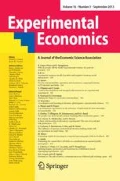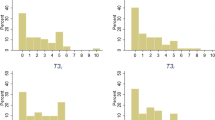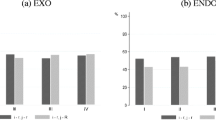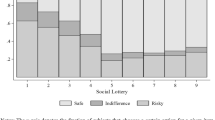Abstract
This paper reports the results of a ‘probabilistic dictator game’ experiment in which subjects were given an option to share chances to win a prize with a dummy player. Using a within-subject design we manipulated two aspects of the decision, the relative cost of sharing and the nature of the lottery: the draws were either independent for the two players (‘noncompetitive’ condition) or one’s success meant other’s failure (‘competitive’ condition). We also asked for decisions in a standard, non-probabilistic, setting. The main results can be summarized as follows: first, a substantial fraction of subjects do share chances to win, also in the competitive treatments, thus showing concern for the other player that cannot be explained by outcome-based models. Second, subjects share less in the competitive treatment than in other treatments, indicating that procedural fairness alone cannot explain the data. Overall, these results suggest that models aiming at generalizing social concerns to risky environments will have to rely on a mix of distributive and procedural fairness.
Similar content being viewed by others
References
Andersen, S., Harrsion, G., Lau, M., & Rutstrom, E. (2006). Elicitation using multiple price list formats. Experimental Economics, 9, 383–405.
Andreoni, J., & Miller, J. (2002). Giving according to GARP: an experimental test of the consistency of preferences for altruism. Econometrica, 70, 737–754.
Bolton, G. E., & Ockenfels, A. (2000). ERC: a theory of equity, reciprocity and competition. American Economic Review, 90, 166–193.
Bolton, G. E., Brandts, J., & Ockenfels, A. (2005). Fair procedures: evidence from games involving lotteries. Economic Journal, 115, 1054–1076.
Brennan, G., Güth, W., Gonzalez, L., & Levati, M. V. (2008). Attitudes toward private and collective risks in individual and strategic choice situations. Journal of Economic Behavior and Organization.
Charness, G., & Rabin, M. (2002). Understanding social preferences with simple tests. Quartely Journal of Economics, 117, 817–869.
Dana, J., Weber, R., & Kuang, J. (2007). Exploiting moral wriggle room: experiments demonstrating an illusory preference for fairness. Economic Theory, 33, 67–80.
Engelmann, D., & Strobel, M. (2004). Inequality aversion, efficiency, and maximin preferences in simple distribution experiments. American Economic Review, 94, 857–869.
Fehr, E., & Schmidt, K. M. (1999). A theory of fairness, competition, and cooperation. Quarterly Journal of Economics, 114, 817–868.
Fischbacher, U. (2007). z-Tree: Zurich toolbox for ready-made economic experiments. Experimental Economics, 10, 171–178.
Gächter, S., & Riedl, A. (2005). Moral property rights in bargaining with infeasible claims. Management Science, 51, 249–263.
Güth, W., Levati, V., & Ploner, M. (2008). On the social dimension of time and risk preferences: an experimental study. Economic Inquiry, 46, 261–272.
Karni, E., Salmon, T., & Sopher, B. (2008). Individual sense of fairness: an experimental study. Experimental Economics, 11, 174–179.
Koch, A. K., & Normann, H.-T. (2008). Giving in dictator games: regard for others or regard by others? Southern Economic Journal, 75, 223–231.
Monin, B., & Miller, D. (2001). Moral credentials and the expression of prejudice. Journal of Personality and Social Psychology, 81, 33–43.
Murnighan, J. K., Oeschb, J. M., & Pillutlac, M. (2001). Player types and self-impression management in dictatorship games: two experiments. Games and Economic Behavior, 37, 388–414.
Trautmann, S. (2009). A tractable model of process fairness under risk. Journal of Economic Psychology, 30, 803–813.
Author information
Authors and Affiliations
Corresponding author
Rights and permissions
About this article
Cite this article
Krawczyk, M., Le Lec, F. ‘Give me a chance!’ An experiment in social decision under risk. Exp Econ 13, 500–511 (2010). https://doi.org/10.1007/s10683-010-9253-5
Received:
Accepted:
Published:
Issue Date:
DOI: https://doi.org/10.1007/s10683-010-9253-5
Keywords
- Social preferences
- Other-regarding preferences
- Inequity aversion
- Social concern
- Social preferences under risk
- Procedural fairness




